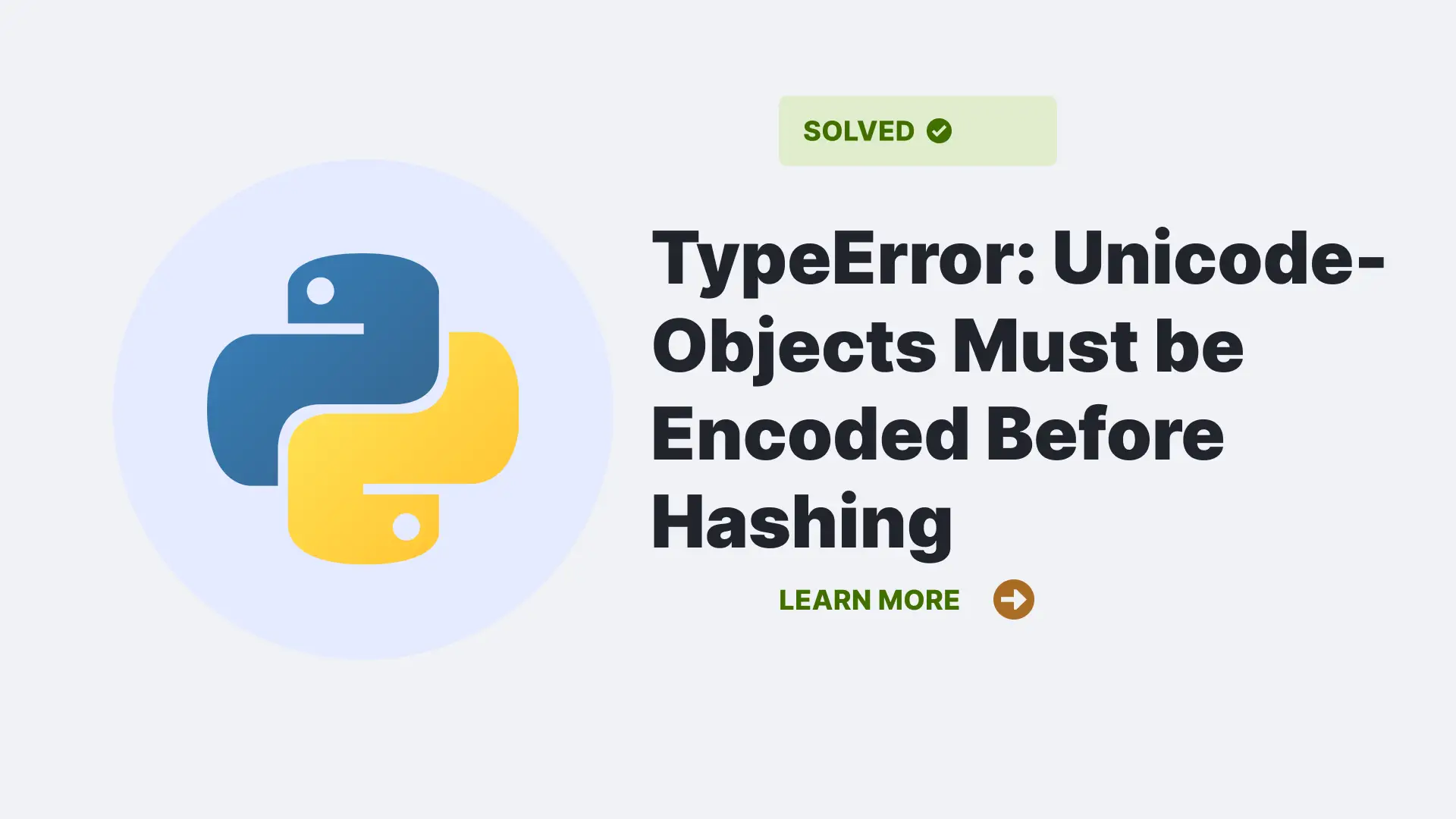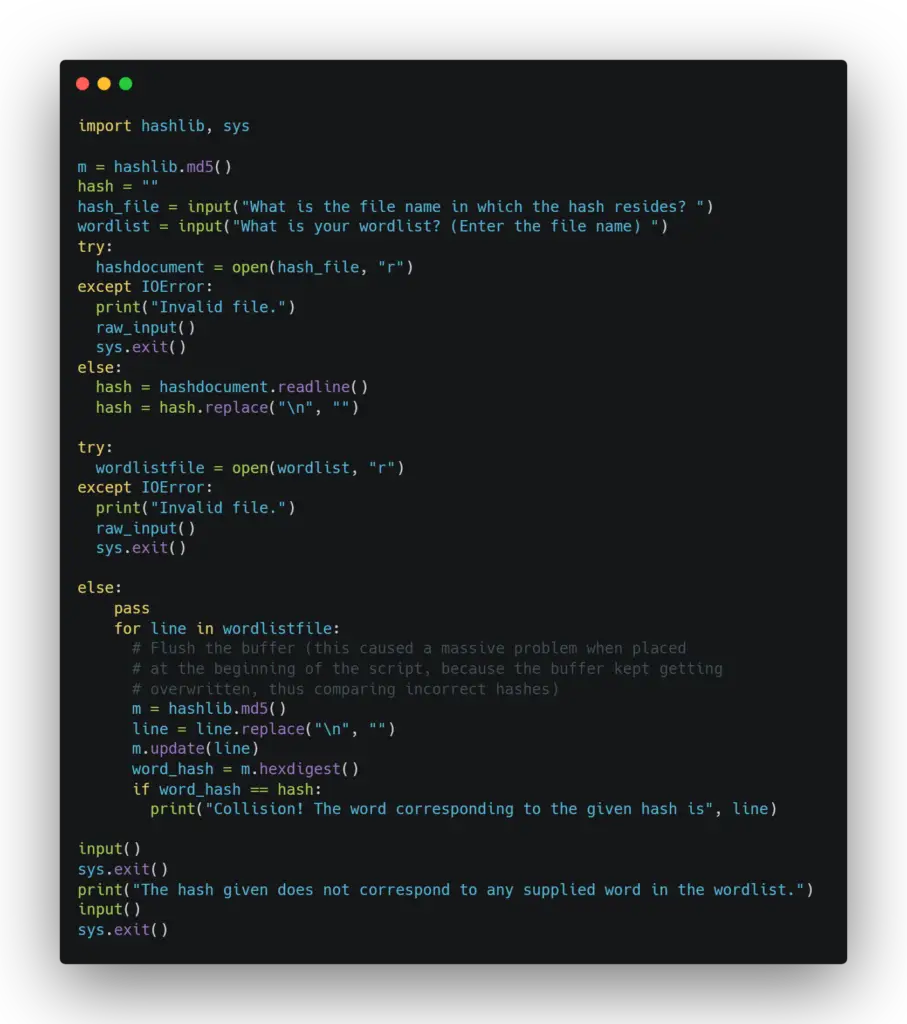- How to correct TypeError: Unicode-objects must be encoded before hashing?
- EDIT
- Python TypeError: Unicode-objects must be encoded before hashing
- How to reproduce the error
- How to fix the error
- Calling the update() method
- Take your skills to the next level ⚡️
- About
- Search
- Tags
- How to correct TypeError: Unicode-Objects Must be Encoded Before Hashing?
- What is typeError?
- Causes for typeError
- What is Hashing?
- What is hashlib?
- What is typeError: Unicode-objects must be encoded before hashing?
- Causes for typeError: Unicode objects must be encoded before hashing error and its solution
- By being Hashed but not encoded
- Solution
- By Passing string_to_hash in different python values
- solution
- By Character encoding From Wordlistfile
- Solution
- By Utf-8 Encoding system
- Solution
- Conclusion
- References
How to correct TypeError: Unicode-objects must be encoded before hashing?
when I try to execute this code in Python 3.2.2:
import hashlib, sys m = hashlib.md5() hash = "" hash_file = input("What is the file name in which the hash resides? ") wordlist = input("What is your wordlist? (Enter the file name) ") try: hashdocument = open(hash_file, "r") except IOError: print("Invalid file.") raw_input() sys.exit() else: hash = hashdocument.readline() hash = hash.replace("n", "") try: wordlistfile = open(wordlist, "r") except IOError: print("Invalid file.") raw_input() sys.exit() else: pass for line in wordlistfile: # Flush the buffer (this caused a massive problem when placed # at the beginning of the script, because the buffer kept getting # overwritten, thus comparing incorrect hashes) m = hashlib.md5() line = line.replace("n", "") m.update(line) word_hash = m.hexdigest() if word_hash == hash: print("Collision! The word corresponding to the given hash is", line) input() sys.exit() print("The hash given does not correspond to any supplied word in the wordlist.") input() sys.exit() It is probably looking for a character encoding from wordlistfile .
wordlistfile = open(wordlist,"r",encoding='utf-8') Or, if you’re working on a line-by-line basis:
EDIT
Per the comment below and this answer.
My answer above assumes that the desired output is a str from the wordlist file. If you are comfortable in working in bytes , then you’re better off using open(wordlist, «rb») . But it is important to remember that your hashfile should NOT use rb if you are comparing it to the output of hexdigest . hashlib.md5(value).hashdigest() outputs a str and that cannot be directly compared with a bytes object: ‘abc’ != b’abc’ . (There’s a lot more to this topic, but I don’t have the time ATM).
It should also be noted that this line:
That will work for both bytes and str’s. But if you decide to simply convert to bytes , then you can change the line to:
You must have to define encoding format like utf-8 ,
Try this easy way,
This example generates a random number using the SHA256 algorithm:
>>> import hashlib >>> hashlib.sha256(str(random.getrandbits(256)).encode('utf-8')).hexdigest() 'cd183a211ed2434eac4f31b317c573c50e6c24e3a28b82ddcb0bf8bedf387a9f' import hashlib string_to_hash = '123' hash_object = hashlib.sha256(str(string_to_hash).encode('utf-8')) print('Hash', hash_object.hexdigest()) To store the password (PY3):
import hashlib, os password_salt = os.urandom(32).hex() password = '12345' hash = hashlib.sha512() hash.update(('%s%s' % (password_salt, password)).encode('utf-8')) password_hash = hash.hexdigest() The error already says what you have to do. MD5 operates on bytes, so you have to encode Unicode string into bytes , e.g. with line.encode(‘utf-8’) .
Please take a look first at that answer.
The bytes in your wordlist file are being automatically decoded to Unicode by Python 3 as you read from the file. I suggest you do:
m.update(line.encode(wordlistfile.encoding)) so that the encoded data pushed to the md5 algorithm are encoded exactly like the underlying file.
encoding this line fixed it for me.
You could open the file in binary mode:
import hashlib with open(hash_file) as file: control_hash = file.readline().rstrip("n") wordlistfile = open(wordlist, "rb") # . for line in wordlistfile: if hashlib.md5(line.rstrip(b'nr')).hexdigest() == control_hash: # collision Python TypeError: Unicode-objects must be encoded before hashing
One error that you might encounter when running Python code is:
Or if you’re using the latest Python version:
These two errors usually occur when you use the hashlib module to hash strings.
The following examples show how you can fix this error in your code.
How to reproduce the error
Suppose you want to create an md5 hash from a string in Python.
You may pass a string variable to the hashlib.md5() method as follows:
But because hashlib hashing methods require an encoded string, it responds with an error:
If you’re using Python version 3.9 or above, the error message has been changed slightly to:
But because strings in Python 3 use Unicode encoding by default, the meaning of both errors is the same.
How to fix the error
To fix this error, you need to encode the string passed to the hashing method.
This is easy to do with the string.encode() method:
Unless you have specific requirements, using UTF-8 should be okay because it’s the most common character encoding method. By default, the encode() method will use UTF-8 encoding when you don’t pass any argument. I’m just showing you how to pass one if you need it.
If you’re passing a literal string to the hashing method, you can use the byte string format.
As you can see from the hexdigest() output, the hashing results are identical.
You need to encode the string no matter if you use sha256 , sha512 , or md5 hash algorithm.
Calling the update() method
Note that you also need to encode the string passed to the hashlib.update() method like this:
If you don’t encode() the string, then Python will raise the same error.
Now you’ve learned how to fix Python ‘Unicode-objects or Strings must be encoded before hashing’ error.
I hope this article was helpful. See you in other articles! 🍻
Take your skills to the next level ⚡️
I’m sending out an occasional email with the latest tutorials on programming, web development, and statistics. Drop your email in the box below and I’ll send new stuff straight into your inbox!
About
Hello! This website is dedicated to help you learn tech and data science skills with its step-by-step, beginner-friendly tutorials.
Learn statistics, JavaScript and other programming languages using clear examples written for people.
Search
Type the keyword below and hit enter
Tags
Click to see all tutorials tagged with:
How to correct TypeError: Unicode-Objects Must be Encoded Before Hashing?
TypeError: Unicode objects must be encoded before hashing error is a kind of error that is difficult to deal with for the first time or have faced it before. In both cases, this guide will help you whether you are a beginner in Python or familiar with the terms of python.
- 1 What is typeError?
- 2 Causes for typeError
- 3 What is Hashing?
- 4 What is hashlib?
- 5 What is typeError: Unicode-objects must be encoded before hashing?
- 6 Causes for typeError: Unicode objects must be encoded before hashing error and its solution
- 6.1 By being Hashed but not encoded
- 6.2 Solution
- 6.3 By Passing string_to_hash in different python values
- 6.4 solution
- 6.5 By Character encoding From Wordlistfile
- 6.6 Solution
- 6.7 By Utf-8 Encoding system
- 6.8 Solution
What is typeError?
TypeError in python is an exception error that results when the user code shows that the attempted operation on the taken object is not supported.
Basically, it occurs when a wrong type of object is used in an operation or function with a string attached that will give details about the error. It can also arise when the wrong type of arguments are passed in a coding. This case is an example of an exception error.
Causes for typeError
This type of error is caused due to various causes, one of which is when an operand or argument passed to a function is not compatible with the expected operator or function. Other instances where typeError arises is when you try to change a value of a variable that can not be changed or attempt to change a value in an inappropriate way.
This type of simple TypeError can be fixed by adjusting the errors by using the traceback methods. In which you can find the source of the errors on the error message and then change it to fix it.
What is Hashing?
Hashing is a method that is used to return an object’s hash value using a module. Basically, it returns the integer values that are used to compare dictionary keys by using the dictionary look-up feature.
For hashing, you need to use the __hash__() function of an object which is set by default when the object was created by the user.
What is hashlib?
the typeError: Unicode objects must be encoded before hashing is mainly related to the usage of hashlib. So basically, the hashlib module of python is an interface for hashing raw messages easily in an encrypted format. Its main function is to use the hash function on a string and encrypt it so well that it should be very difficult to decrypt it.
What is typeError: Unicode-objects must be encoded before hashing?
The typeError: Unicode-objects must be encoded before hashing error python appears when you try to pass a string to a hashing algorithm without encoding it or due to any confusion between versions of python. This type of error is a part of an exception error.
The above code is a common example where you can find the typeError: Unicode-objects must be encoded before hashing error which can be caused due to various reasons.
Causes for typeError: Unicode objects must be encoded before hashing error and its solution
The typeError: Unicode-objects must be encoded before hashing error is caused basically due to the lack of encoding. Thus the causes of these errors are related to encodings Such as:
By being Hashed but not encoded
This basically causes when a Unicode object is hashed before being encoded. As the Unicode object needs to be encoded before using the hash.
Solution
As the error caused due to this specific reason lies with the encoding of the object, the solution to this is to simply encode the Unicode objects before checking them. You can use haslib and the SHA256 algorithm for it.
return hashlib.sha256(msg.encode(‘utf-8’)).hexdigest()By Passing string_to_hash in different python values
This is caused solely due to different string_to_hash functions on a different python version.
solution
The string_to_hash function varies with different versions of python. For example, in python 2, you can simply use the str and Unicode for the string so the string_to_hash will work, but that would not be the case in python-3. In Python-3, the string_to_hash and Unicode are two different things so the Unicode value will be required separately.
By Character encoding From Wordlistfile
This type of cause for errors is related to the usage of the Hash and wordlistfile, which generally require two reasons that are proper character encoding from wordlistfile or on a line-by-line basis. This generally arises while working on hashlib and sys. Here the desired output would be a string. This may need character encoding from any of the wordlistfiles or by a line-by-line basis like
Wordlistfile = open(wordlist,“r”,encoding=‘utf-8’)Solution
When you face the typeError: Unicode-objects must be encoded before hashing error because of character encoding from wordlistfile then you can work in bytes as this will be better than working with open(wordlist, “rb”). But for this, you must ensure your hash file does not use “rb”
For using bytes, you may use the line function, so instead of using the “line.replace”, you can use “line.strip()” command as this will help convert both strings or bytes to bytes. While using this method, if you specify and encode, then this will change the way the bytes get decoded on the disc to get the strings.
By Utf-8 Encoding system
Errors caused by this type of cause are generally complicated. This is faced while working with the hashlib and UTF-8 encoding systems, which are a bit complicated on their own. UTF-8 encoding system is basically an encoding system that is used to represent Unicode text on web pages.
Solution
The typeerror: unicode-objects must be encoded before hashing error caused due to this reason can be solved by using “encoding format” which is a relatively easier and safer solution for the problem. You can use the following code to generate a random number using SHA256 if needed.
Import hashlib hashlib.sha256(str(random.getrandbits(256)).encode(‘utf-8’)).hexdigest()Conclusion
The typeError: Unicode-objects must be encoded before hashing is a type of exception error that can be resolved by using the mentioned methods. This article will help you understand the causes and provide the required solution for it.
References
To learn more error resolving techniques, follow pythonclear/errors.


